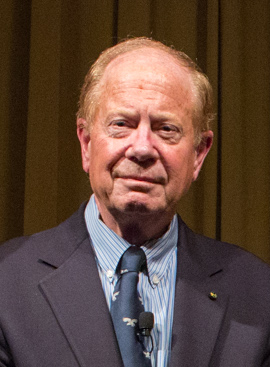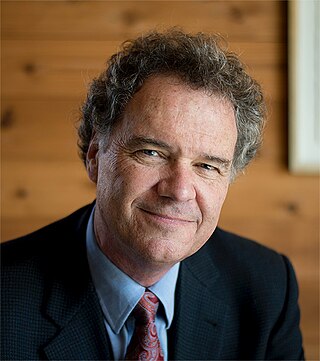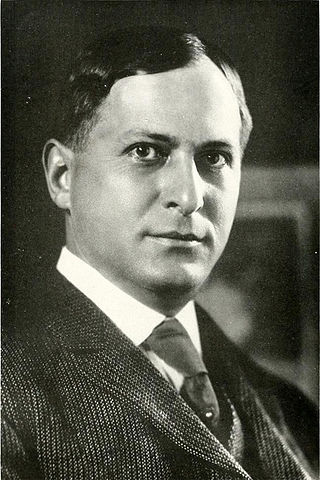Related Research Articles

Gary Kilgore North was an American writer, Austrian School economic historian, and leading figure in the Christian reconstructionist movement. North authored or coauthored over fifty books on topics including Reformed Protestant theology, economics, and history. He was an Associated Scholar of the Mises Institute.

Jefferson F. Davis was an American politician who served as the first and only president of the Confederate States from 1861 to 1865. He represented Mississippi in the United States Senate and the House of Representatives as a member of the Democratic Party before the American Civil War. He had previously served as the United States Secretary of War from 1853 to 1857 under President Franklin Pierce.

Robert Floyd Curl Jr. was an American chemist who was Pitzer–Schlumberger Professor of Natural Sciences and Professor of Chemistry at Rice University. He was awarded the Nobel Prize in Chemistry in 1996 for the discovery of the nanomaterial buckminsterfullerene, and hence the fullerene class of materials, along with Richard Smalley and Harold Kroto of the University of Sussex.

Robert Penn Warren was an American poet, novelist, and literary critic and was one of the founders of New Criticism. He was also a charter member of the Fellowship of Southern Writers. He founded the literary journal The Southern Review with Cleanth Brooks in 1935. He received the 1947 Pulitzer Prize for the Novel for All the King's Men (1946) and the Pulitzer Prize for Poetry in 1958 and 1979. He is the only person to have won Pulitzer Prizes for both fiction and poetry.

Thomas Jefferson was an American statesman, diplomat, lawyer, architect, philosopher, and Founding Father who served as the third president of the United States from 1801 to 1809. Among the Committee of Five charged by the Second Continental Congress with authoring the Declaration of Independence, Jefferson was the Declaration's primary author, writing it between June 11 and June 28, 1776 at a three-story residence at 700 Market Street in Philadelphia. Following the American Revolutionary War and prior to becoming the nation's third president in 1801, Jefferson was the first United States secretary of state under George Washington and then the nation's second vice president under John Adams.

Joseph John-Michael Ellis III is a Pulitzer Prize-winning American historian whose work focuses on the lives and times of the Founding Fathers of the United States. His book American Sphinx: The Character of Thomas Jefferson won a National Book Award in 1997 and Founding Brothers: The Revolutionary Generation won the 2001 Pulitzer Prize for History. Both these books were bestsellers.

"Life, Liberty and the pursuit of Happiness" is a well-known phrase from the United States Declaration of Independence. The phrase gives three examples of the unalienable rights which the Declaration says have been given to all humans by their Creator, and which governments are created to protect. Like the other principles in the Declaration of Independence, this phrase is not legally binding, but has been widely referenced and seen as an inspiration for the basis of government.

Towson University is a public university in Towson, Maryland. Founded in 1866 as Maryland's first training school for teachers, Towson University is a part of the University System of Maryland. Since its founding, the university has evolved into eight subsidiary colleges with over 20,000 students. Its 329-acre campus is situated in Baltimore County, Maryland eight miles north of downtown Baltimore. Towson is one of the largest public universities in Maryland and still produces the most teachers of any university in the state.

Frank Curtis "Curt" Michel was an American astrophysicist; a professor of astrophysics at Rice University in Houston, Texas; a United States Air Force pilot; and a NASA astronaut.
William Archibald Dunning was an American historian and political scientist at Columbia University noted for his work on the Reconstruction era of the United States. He founded the informal Dunning School of interpreting the Reconstruction era through his own writings and the Ph.D. dissertations of his numerous students. Dunning has been criticized for advocating white supremacist interpretations, his "blatant use of the discipline of history for reactionary ends" and for offering "scholarly legitimacy to the disenfranchisement of southern blacks and to the Jim Crow system."

Edward Lynn "Ed" Ayers is an American historian, professor, administrator, and university president. In July 2013, he was awarded the National Humanities Medal by President Barack Obama at a White House ceremony for Ayers's commitment “to making our history as widely available and accessible as possible." He served as the president of the Organization of American Historians in 2017–18.

Edgar Odell Lovett was an American educator and education administrator.
Alan Gallay is an American historian. He specializes in the Atlantic World and Early American history, including issues of slavery. He won the Bancroft Prize in 2003 for his The Indian Slave Trade: the Rise of the English Empire in the American South, 1670-1717.
Ronald Hamowy was a Canadian academic, known primarily for his contributions to political and social academic fields. At the time of his death, he was professor emeritus of Intellectual History at the University of Alberta in Edmonton, Canada. Hamowy was closely associated with the political ideology of libertarianism and his writings and scholarship place particular emphasis on individual liberty and the limits of state action in a free society. He is associated with a number of prominent American libertarian organizations.
John Howard "Jack" Yardley, M.D. was an American pathologist known for his work in gastrointestinal pathology. He worked at Johns Hopkins Hospital from 1954 until his retirement in 2006. He served as Baxley Professor of Pathology and director of the Department of Pathology from 1988 to 1992. He also served as associate dean of the Johns Hopkins University School of Medicine from 1977 to 1984. He is regarded as one of the founders of the field of gastrointestinal pathology.
Ira D. Gruber is an American author, bibliographer, and military historian of the American Revolution.

Aaron John Sharp, known professionally as Jack Sharp, was an American botanist and bryologist, considered an expert on mosses. The standard author abbreviation Sharp is used to indicate this person as the author when citing a botanical name.
Charles Pierce Roland was an American historian and professor emeritus of the University of Kentucky who was known for his research field of the American South and the U.S. Civil War. Roland was a Captain in the United States Army and a World War II veteran. He served as the elected president of the Southern Historical Association and contributed to several other historical societies.
William Caleb McDaniel is an American historian. His book Sweet Taste of Liberty: A True Story of Slavery and Restitution in America won the 2020 Pulitzer Prize for History. He is also an Associate professor of History at Rice University.
W. Paul Reeve is an American historian and Simmons Professor of Mormon Studies and History in the History Department at the University of Utah.
References
- 1 2 3 4 5 "John B. Boles," CV Yumpo.com. Retrieved July 7, 2022.
- 1 2 "John Boles: William P. Hobby Professor Emeritus," The People of Rice, Rice University. Retrieved July 7, 2022.
- ↑ Boles, John B., ed. Autobiographical Reflections on Southern Religious History, U. of Georgia Press, 2001, pp. 125-28.
- ↑ "Prof. John B. Boles," Universitat Leipzig. Retrieved July 7, 2022. Note: Some websites say 1967, not 1969.
- 1 2 "John B. Boles," biography, Past recipients of Cherry Award, Baylor University. Retrieved July 7, 2022.
- ↑ Officers, Southern Historical Association, 2020. Retrieved July 7, 2022.
- ↑ "Jefferson: Architect of American Liberty." Rice University's Baker Institute for Public Policy. Retrieved July 7, 2022. [Note: This is about a book-signing event, and includes a video presentation by Boles.]
- ↑ Yardley, Jonathan. "The complex Thomas Jefferson in his place and time," The Washington Post, May 12, 2017. Retrieved July 7, 2022.
- ↑ "Rice History Professor to Be Honored at Cherry Award Banquet," Baylor University, Sept. 20, 1999. Retrieved July 7, 2022.
- ↑ "George R. Brown Teaching Awards", Center for Teaching Excellence, Rice University. Retrieved July 7, 2022.